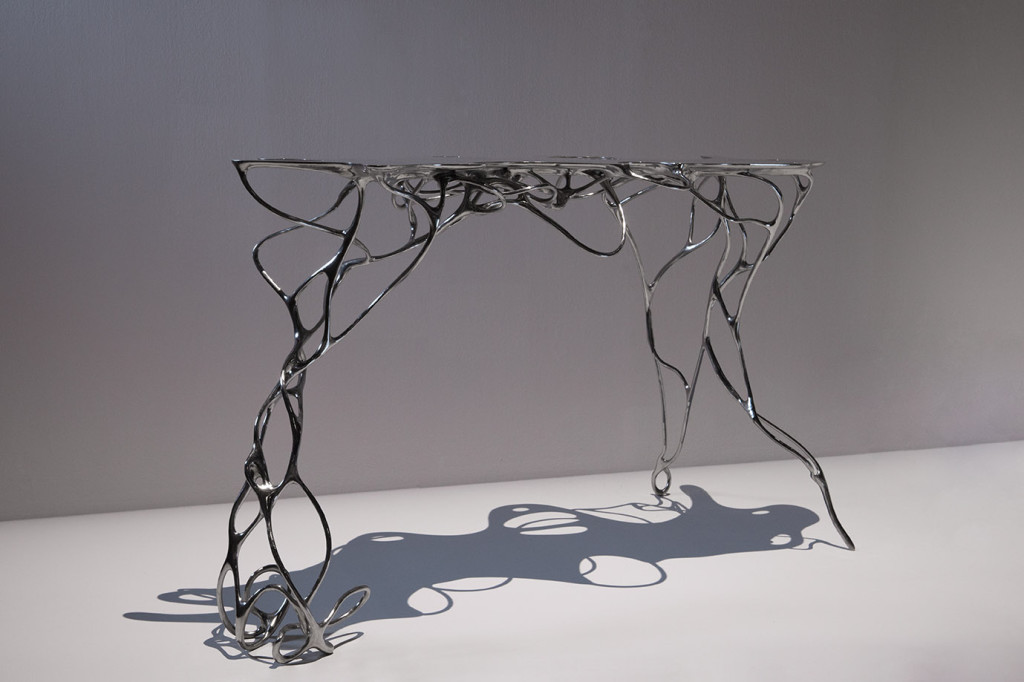
Growth Table Titanium, resulting from a pioneering experimental research initiated in 2013 by Mathias Bengtsson, combines art, craftsmanship and the latest technology in a highly organic form of artistic expression. For the work Growth Table Titanium , Mathias Bengtsson developed a ground-breaking organic growth simulation software based on a parametric grid (approximately 1,000 parameters to set mass, energy, gravity, pressure) within which he allows algorithms to develop. His process interprets the growth model of plants that works on the division and differentiation of cells. The performances of living organisms are analyzed and applied to the performance of materials to generate unique and complex forms that blur the frontiers between design, art, crafts and scientific research. The work is produced using an additive metal manufacturing process known as EBM® (Electron Beam Melting), which is used to produce titanium parts in the aeronautics and defense industries. Mathias Bengtsson is one of the most innovative artists in terms of his use of digital technologies, through which he is able to design objects with complex forms using new materials. His « computational design » is based on a language of algorithms, bringing him close to the approach taken by architects to generate forms using parametric calculations.
Mathias Bengtsson is world famous for his visually striking and technically innovative sculptures. Working with various processes and industrial materials, Bengtsson continues to push back the boundaries of the sculpturally, technically and philosophically possible in terms of three-dimensional design. Always seeking out new means of expression, he disrupts the limits of the established relationships between design, art, crafts and new technologies.
Mathias Bengtsson (born in Copenhagen in 1971) studied at the Royal College of Art and the Danish Design school in Copenhagen. After founding his studio in 2002, he moved to Stockholm in 2007. His creations (Slice Chair – 1998, Spun Chair – 2002, Cellular Chair – 2011, Growth Chair – 2012) combine craftsmanship and cutting-edge technology and push back the sculptural, technical and philosophical boundaries of three-dimensional design.
Museum collections:
Pompidou Centre, Paris France; MoMA, Museum of Modern Art, New York, USA; The Museum of Fine arts, Houston, USA; The Mint Museum of Art, North Carolina, USA; High Museum of Art, Atlanta, USA; Indianapolis Museum of Art, Indianapolis, USA; Montreal Museum of Art, Montreal, Canada; Frank Cohan Collection, Manchester, UK; Manchester Art Gallery, Manchester, UK; The Lowery, Manchester, UK; Cass Sculpture Foundation, West Sussex, UK; Röhsska Museet, Gothenburg, Sweden; Stedelijk Museum, Amsterdam, Holland; Danish Museum of Decorative Arts, Copenhagen, Denmark.
INITIAL, PRODWAYS GROUP
Combining cutting-edge technology and craftsmanship, for over 25 years Initial has been making original items for its customers from the world of industry, but also for luxury goods houses, designers, artists and architects with made-to-measure, exclusive and unique creations.
In 2016, to capitalise on its savoir-faire, Initial created a division devoted entirely to the creative arts, « Les Créations », with the aim of: being the only player in the world to offer a package of multi- technologies, and the full range of 3D printing services and materials to the most demanding creative customers, with the quality finishing of French craftsmanship.
PATRONAGE OF THE LEGAL FIRM FLEURANCE DE GAULLE & ASSOCIES
Louis de Gaulle, Partner: « sponsoring the Growth Table Titanium project by Mathias Bengtsson is an opportunity to demonstrate our positioning at the leading edge of issues related to intellectual property and new technologies. »
Artists have embraced additive manufacturing as a new creative tool. This technique also attracts engineers, businesses and other players interested in its industrial and commercial potential – which brings with it a multitude of legal questions, the leading one being intellectual property law (copyright, patents, trade marks and designs and models), which protects all forms of creation, ensuring the regulation, control and sanctioning of any reproduction of a work or object not authorised by the rights holder.


